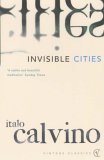invisible cities
'The city of Leonia refashions itself every day: every morning the people wake between fresh sheets, wash with just-unwrapped cakes of soap, wear brand-new clothing, take from the latest model refridgerator still unopened tins, listening to the last-minute jingles from the most up-to-date radio(…). This is the result: the more Leonia expels goods, the more it accumulates them; the scales of its past are soldered into a cuirass that cannot be removed. As the city is renewed each day, it preserves all of itself in its only definitive form: yesterday’s sweepings piled up on the sweepings of the day before yesterday and of all its days and years and decades (…). Leonia’s rubbish little by little would invade the world, if, from beyond the final crest of its boundless rubbish heap, the street cleaners of other cities were not pressing, also pushing the mountains of refuse in front of themselves (…). The greater its height grows, the more the danger of a landslide looms: a tin can, an old tyre, an unraveled wine flask, if it rolls toward Leonia, is enough to bring with it an avalanche of unmated shoes, calendars of bygone years, withered flowers, submerging the city in its own past, which it had tried in vain to reject, mingling with the past of the neighbouring cities, finally clean. A cataclysm will flatten the sordid mountain range, canceling every trace of the metropolis always dressed in new clothes.'
calvino | cities | waste
cite [at] webcite.org.uk
